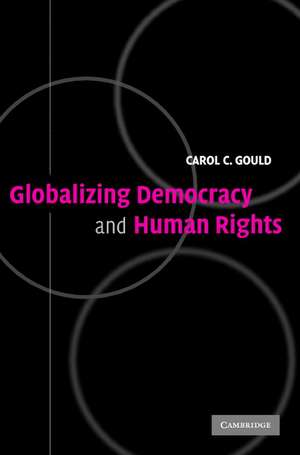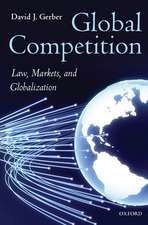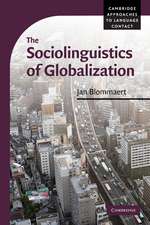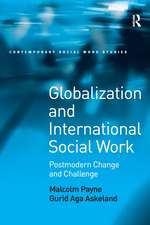Globalizing Democracy and Human Rights
Autor Carol C. Goulden Limba Engleză Paperback – aug 2004
| Toate formatele și edițiile | Preț | Express |
|---|---|---|
| Paperback (1) | 223.29 lei 6-8 săpt. | |
| Cambridge University Press – aug 2004 | 223.29 lei 6-8 săpt. | |
| Hardback (1) | 557.59 lei 6-8 săpt. | |
| Cambridge University Press – aug 2004 | 557.59 lei 6-8 săpt. |
Preț: 223.29 lei
Nou
Puncte Express: 335
Preț estimativ în valută:
42.73€ • 44.82$ • 35.57£
42.73€ • 44.82$ • 35.57£
Carte tipărită la comandă
Livrare economică 01-15 aprilie
Preluare comenzi: 021 569.72.76
Specificații
ISBN-13: 9780521541275
ISBN-10: 0521541271
Pagini: 290
Dimensiuni: 152 x 229 x 17 mm
Greutate: 0.39 kg
Editura: Cambridge University Press
Colecția Cambridge University Press
Locul publicării:New York, United States
ISBN-10: 0521541271
Pagini: 290
Dimensiuni: 152 x 229 x 17 mm
Greutate: 0.39 kg
Editura: Cambridge University Press
Colecția Cambridge University Press
Locul publicării:New York, United States
Cuprins
Acknowledgements; Introduction: between the personal and the global; Part I. Theoretical Considerations: 1. Hard questions in democratic theory: when justice and democracy conflict; 2. Two concepts of universality and the problem of cultural relativism; Part II. Democracy and Rights, Personalized and Pluralized: 3. Embodied politics; 4. Racism and democracy; 5. Cultural identity, group rights, and social ontology; 6. Conceptualizing women's human rights; Part III. Globalizing Democracy in a Human Rights Framework: 7. Evaluating the claims for a global democracy; 8. Are democracy and human rights compatible in the context of globalization?; 9. The global democratic deficit and economic human rights; Part IV. Current Applications: 10. Democratic management and the stakeholder idea; 11. Democratic networks: technological and political; 12. Terrorism, empathy, and democracy; Index.
Recenzii
"[This book] is wide-ranging, thought-provoking, and challenging. There is plenty here to interest political theorists concerned with democracy and justice, human rights, cultural difference, women's issues, economic organization, technology, and the international system. On all these issues, gould's voice is powerful and original." Notre Dame Philosophical Reviews, John S. Dryze, Australian National University
"Carol Gould's new book is a state-of-the-art treatment of the most exciting and contested issue in political philosophy today--that of global justice."
Omar Dahbour, Social Theory and Practice
"Globalizing Democracy and Human Rights is a magnificent book. The final chapter, 'terrorism, empathy and democracy' is particularly revealing in the current global climate. By highlighting the ways in which the lack of democratic possibilities may contribute to the conditions of terrorism, Gould moves the debate beyond the facile moralizing of good and evil toward an approach grounded in the actual political conditions of the contemporary world order. This book should be required reading not just for political philosophers and international relations scholars but also, and perhaps especially, for foreign policy makers in the world's most powerful countries." - Fiona Robinson, Carleton University
"Carol Gould's new book is a state-of-the-art treatment of the most exciting and contested issue in political philosophy today--that of global justice."
Omar Dahbour, Social Theory and Practice
"Globalizing Democracy and Human Rights is a magnificent book. The final chapter, 'terrorism, empathy and democracy' is particularly revealing in the current global climate. By highlighting the ways in which the lack of democratic possibilities may contribute to the conditions of terrorism, Gould moves the debate beyond the facile moralizing of good and evil toward an approach grounded in the actual political conditions of the contemporary world order. This book should be required reading not just for political philosophers and international relations scholars but also, and perhaps especially, for foreign policy makers in the world's most powerful countries." - Fiona Robinson, Carleton University
Notă biografică
Descriere
In this 2004 book Carol Gould addresses the fundamental issue of democratizing globalization.

















